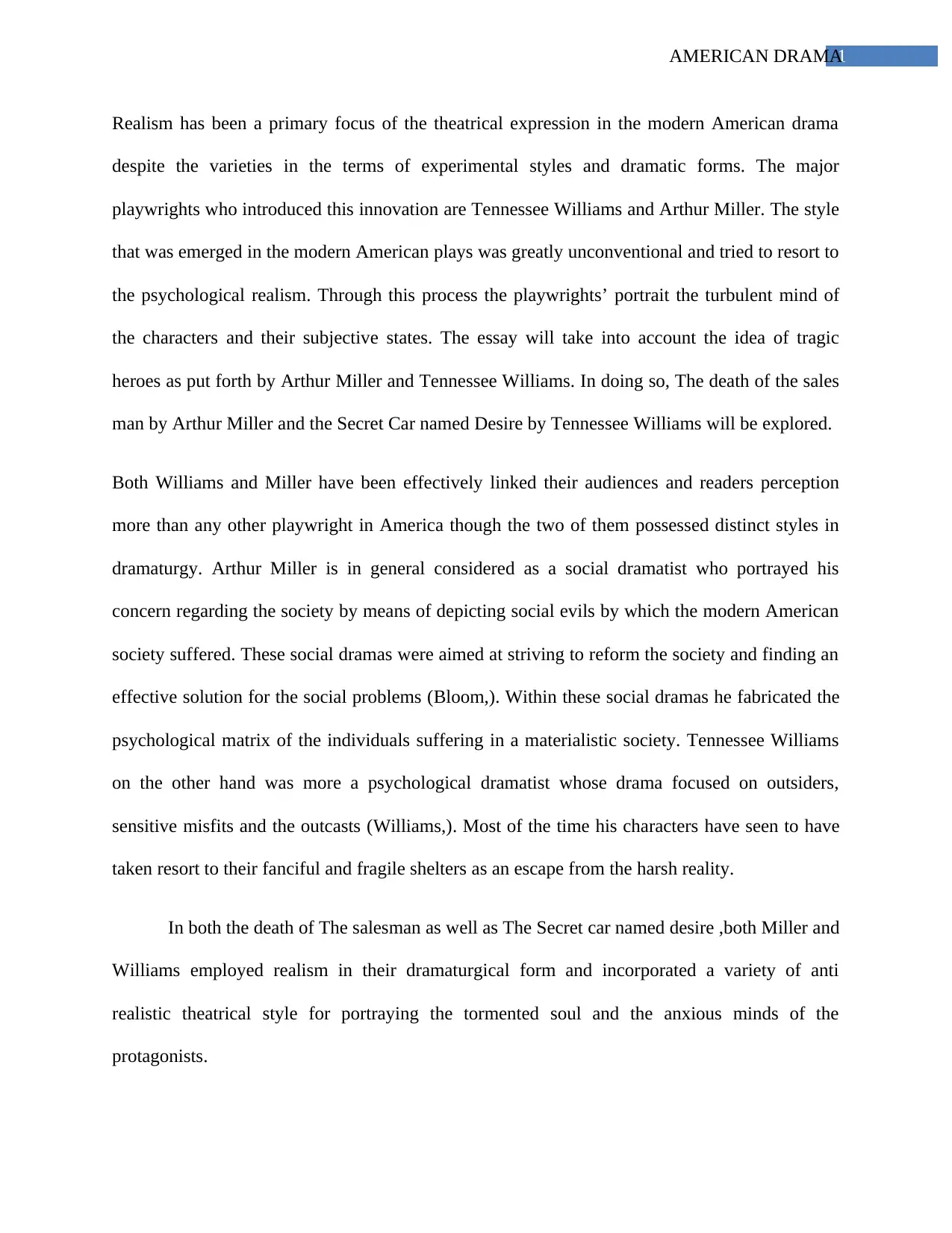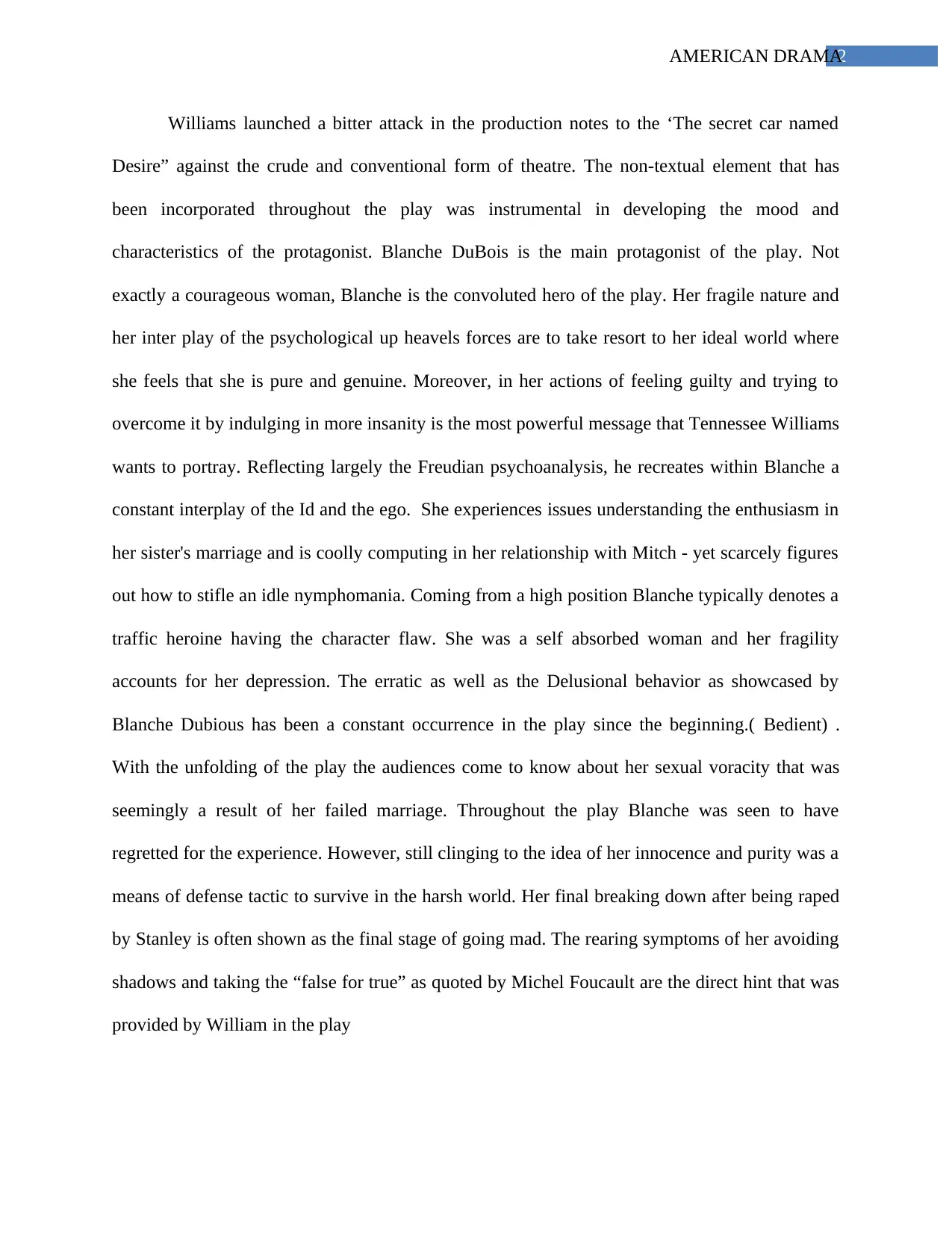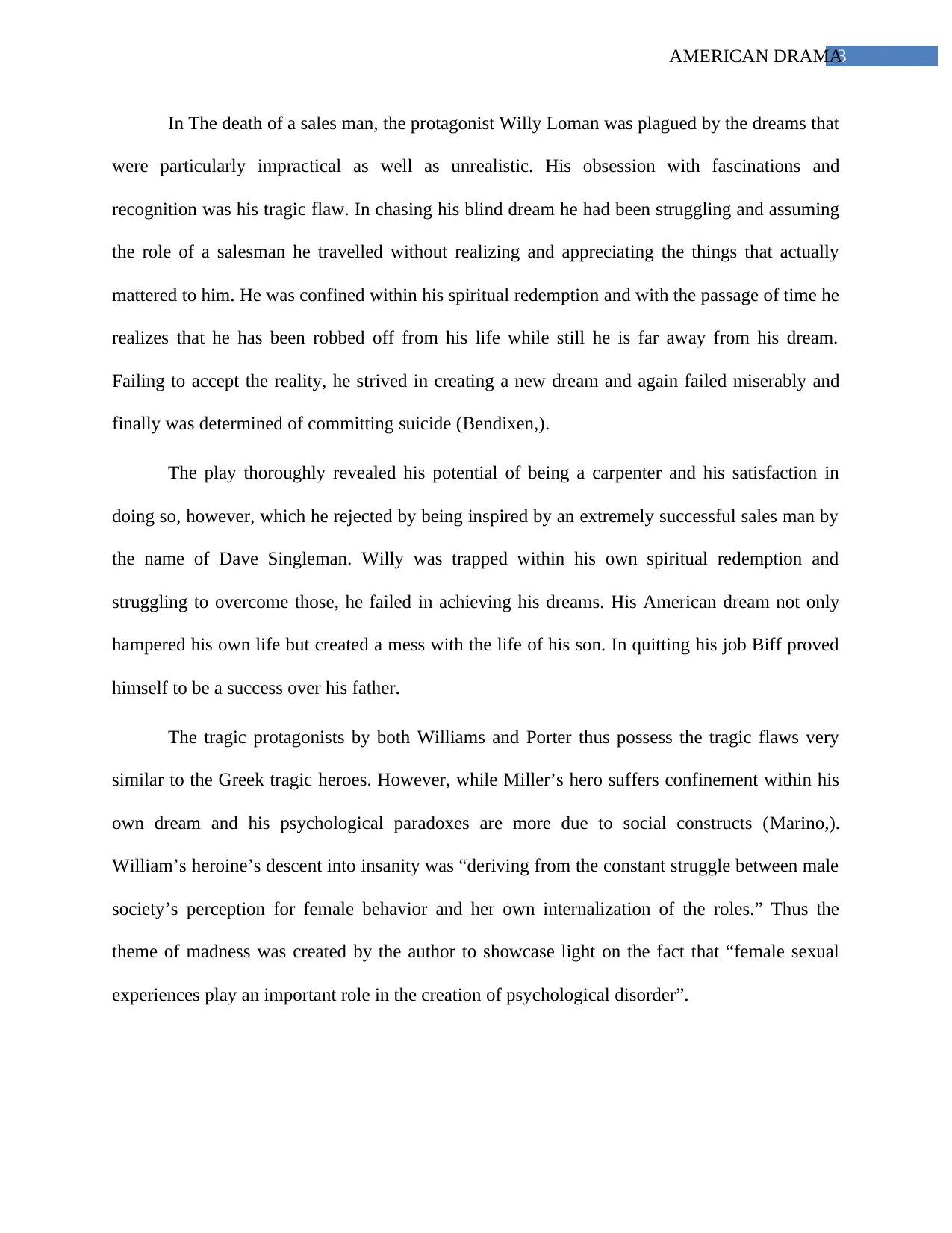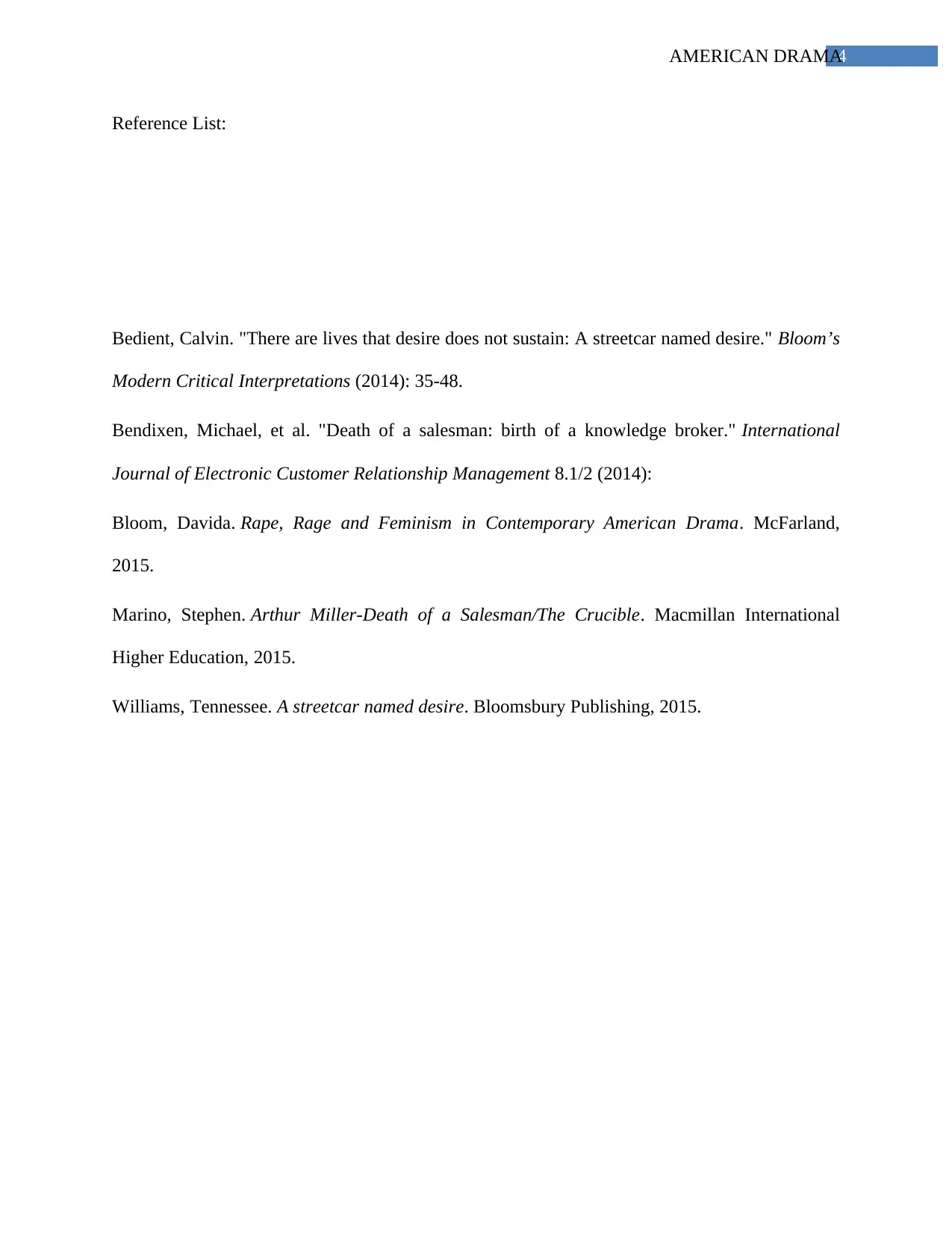American Drama: Tragic Heroes in Death of a Salesman and Streetcar
VerifiedAdded on 2022/09/06
|5
|1172
|40
Essay
AI Summary
This essay delves into the concept of tragic heroes as portrayed by Arthur Miller and Tennessee Williams in American drama. It examines Miller's "Death of a Salesman" and Williams' "A Streetcar Named Desire," highlighting how both playwrights employed realism and incorporated anti-realistic elements to depict the psychological turmoil of their protagonists. The essay contrasts Miller's focus on social constructs and the American Dream with Williams' exploration of psychological disorders and societal expectations, particularly concerning female characters. It analyzes the tragic flaws of Willy Loman and Blanche DuBois, drawing parallels to Greek tragic heroes while emphasizing the unique contexts of their suffering within the American landscape. The essay references critical analyses by scholars such as Bloom, Bedient, Bendixen, and Marino to support its arguments, providing a comprehensive understanding of the tragic hero archetype in modern American drama.

RUNNING HEAD: AMERICAN DRAMA
Name of the Student:
Name of University:
Author Note:
Name of the Student:
Name of University:
Author Note:
Paraphrase This Document
Need a fresh take? Get an instant paraphrase of this document with our AI Paraphraser

1AMERICAN DRAMA
Realism has been a primary focus of the theatrical expression in the modern American drama
despite the varieties in the terms of experimental styles and dramatic forms. The major
playwrights who introduced this innovation are Tennessee Williams and Arthur Miller. The style
that was emerged in the modern American plays was greatly unconventional and tried to resort to
the psychological realism. Through this process the playwrights’ portrait the turbulent mind of
the characters and their subjective states. The essay will take into account the idea of tragic
heroes as put forth by Arthur Miller and Tennessee Williams. In doing so, The death of the sales
man by Arthur Miller and the Secret Car named Desire by Tennessee Williams will be explored.
Both Williams and Miller have been effectively linked their audiences and readers perception
more than any other playwright in America though the two of them possessed distinct styles in
dramaturgy. Arthur Miller is in general considered as a social dramatist who portrayed his
concern regarding the society by means of depicting social evils by which the modern American
society suffered. These social dramas were aimed at striving to reform the society and finding an
effective solution for the social problems (Bloom,). Within these social dramas he fabricated the
psychological matrix of the individuals suffering in a materialistic society. Tennessee Williams
on the other hand was more a psychological dramatist whose drama focused on outsiders,
sensitive misfits and the outcasts (Williams,). Most of the time his characters have seen to have
taken resort to their fanciful and fragile shelters as an escape from the harsh reality.
In both the death of The salesman as well as The Secret car named desire ,both Miller and
Williams employed realism in their dramaturgical form and incorporated a variety of anti
realistic theatrical style for portraying the tormented soul and the anxious minds of the
protagonists.
Realism has been a primary focus of the theatrical expression in the modern American drama
despite the varieties in the terms of experimental styles and dramatic forms. The major
playwrights who introduced this innovation are Tennessee Williams and Arthur Miller. The style
that was emerged in the modern American plays was greatly unconventional and tried to resort to
the psychological realism. Through this process the playwrights’ portrait the turbulent mind of
the characters and their subjective states. The essay will take into account the idea of tragic
heroes as put forth by Arthur Miller and Tennessee Williams. In doing so, The death of the sales
man by Arthur Miller and the Secret Car named Desire by Tennessee Williams will be explored.
Both Williams and Miller have been effectively linked their audiences and readers perception
more than any other playwright in America though the two of them possessed distinct styles in
dramaturgy. Arthur Miller is in general considered as a social dramatist who portrayed his
concern regarding the society by means of depicting social evils by which the modern American
society suffered. These social dramas were aimed at striving to reform the society and finding an
effective solution for the social problems (Bloom,). Within these social dramas he fabricated the
psychological matrix of the individuals suffering in a materialistic society. Tennessee Williams
on the other hand was more a psychological dramatist whose drama focused on outsiders,
sensitive misfits and the outcasts (Williams,). Most of the time his characters have seen to have
taken resort to their fanciful and fragile shelters as an escape from the harsh reality.
In both the death of The salesman as well as The Secret car named desire ,both Miller and
Williams employed realism in their dramaturgical form and incorporated a variety of anti
realistic theatrical style for portraying the tormented soul and the anxious minds of the
protagonists.

2AMERICAN DRAMA
Williams launched a bitter attack in the production notes to the ‘The secret car named
Desire” against the crude and conventional form of theatre. The non-textual element that has
been incorporated throughout the play was instrumental in developing the mood and
characteristics of the protagonist. Blanche DuBois is the main protagonist of the play. Not
exactly a courageous woman, Blanche is the convoluted hero of the play. Her fragile nature and
her inter play of the psychological up heavels forces are to take resort to her ideal world where
she feels that she is pure and genuine. Moreover, in her actions of feeling guilty and trying to
overcome it by indulging in more insanity is the most powerful message that Tennessee Williams
wants to portray. Reflecting largely the Freudian psychoanalysis, he recreates within Blanche a
constant interplay of the Id and the ego. She experiences issues understanding the enthusiasm in
her sister's marriage and is coolly computing in her relationship with Mitch - yet scarcely figures
out how to stifle an idle nymphomania. Coming from a high position Blanche typically denotes a
traffic heroine having the character flaw. She was a self absorbed woman and her fragility
accounts for her depression. The erratic as well as the Delusional behavior as showcased by
Blanche Dubious has been a constant occurrence in the play since the beginning.( Bedient) .
With the unfolding of the play the audiences come to know about her sexual voracity that was
seemingly a result of her failed marriage. Throughout the play Blanche was seen to have
regretted for the experience. However, still clinging to the idea of her innocence and purity was a
means of defense tactic to survive in the harsh world. Her final breaking down after being raped
by Stanley is often shown as the final stage of going mad. The rearing symptoms of her avoiding
shadows and taking the “false for true” as quoted by Michel Foucault are the direct hint that was
provided by William in the play
Williams launched a bitter attack in the production notes to the ‘The secret car named
Desire” against the crude and conventional form of theatre. The non-textual element that has
been incorporated throughout the play was instrumental in developing the mood and
characteristics of the protagonist. Blanche DuBois is the main protagonist of the play. Not
exactly a courageous woman, Blanche is the convoluted hero of the play. Her fragile nature and
her inter play of the psychological up heavels forces are to take resort to her ideal world where
she feels that she is pure and genuine. Moreover, in her actions of feeling guilty and trying to
overcome it by indulging in more insanity is the most powerful message that Tennessee Williams
wants to portray. Reflecting largely the Freudian psychoanalysis, he recreates within Blanche a
constant interplay of the Id and the ego. She experiences issues understanding the enthusiasm in
her sister's marriage and is coolly computing in her relationship with Mitch - yet scarcely figures
out how to stifle an idle nymphomania. Coming from a high position Blanche typically denotes a
traffic heroine having the character flaw. She was a self absorbed woman and her fragility
accounts for her depression. The erratic as well as the Delusional behavior as showcased by
Blanche Dubious has been a constant occurrence in the play since the beginning.( Bedient) .
With the unfolding of the play the audiences come to know about her sexual voracity that was
seemingly a result of her failed marriage. Throughout the play Blanche was seen to have
regretted for the experience. However, still clinging to the idea of her innocence and purity was a
means of defense tactic to survive in the harsh world. Her final breaking down after being raped
by Stanley is often shown as the final stage of going mad. The rearing symptoms of her avoiding
shadows and taking the “false for true” as quoted by Michel Foucault are the direct hint that was
provided by William in the play
⊘ This is a preview!⊘
Do you want full access?
Subscribe today to unlock all pages.

Trusted by 1+ million students worldwide

3AMERICAN DRAMA
In The death of a sales man, the protagonist Willy Loman was plagued by the dreams that
were particularly impractical as well as unrealistic. His obsession with fascinations and
recognition was his tragic flaw. In chasing his blind dream he had been struggling and assuming
the role of a salesman he travelled without realizing and appreciating the things that actually
mattered to him. He was confined within his spiritual redemption and with the passage of time he
realizes that he has been robbed off from his life while still he is far away from his dream.
Failing to accept the reality, he strived in creating a new dream and again failed miserably and
finally was determined of committing suicide (Bendixen,).
The play thoroughly revealed his potential of being a carpenter and his satisfaction in
doing so, however, which he rejected by being inspired by an extremely successful sales man by
the name of Dave Singleman. Willy was trapped within his own spiritual redemption and
struggling to overcome those, he failed in achieving his dreams. His American dream not only
hampered his own life but created a mess with the life of his son. In quitting his job Biff proved
himself to be a success over his father.
The tragic protagonists by both Williams and Porter thus possess the tragic flaws very
similar to the Greek tragic heroes. However, while Miller’s hero suffers confinement within his
own dream and his psychological paradoxes are more due to social constructs (Marino,).
William’s heroine’s descent into insanity was “deriving from the constant struggle between male
society’s perception for female behavior and her own internalization of the roles.” Thus the
theme of madness was created by the author to showcase light on the fact that “female sexual
experiences play an important role in the creation of psychological disorder”.
In The death of a sales man, the protagonist Willy Loman was plagued by the dreams that
were particularly impractical as well as unrealistic. His obsession with fascinations and
recognition was his tragic flaw. In chasing his blind dream he had been struggling and assuming
the role of a salesman he travelled without realizing and appreciating the things that actually
mattered to him. He was confined within his spiritual redemption and with the passage of time he
realizes that he has been robbed off from his life while still he is far away from his dream.
Failing to accept the reality, he strived in creating a new dream and again failed miserably and
finally was determined of committing suicide (Bendixen,).
The play thoroughly revealed his potential of being a carpenter and his satisfaction in
doing so, however, which he rejected by being inspired by an extremely successful sales man by
the name of Dave Singleman. Willy was trapped within his own spiritual redemption and
struggling to overcome those, he failed in achieving his dreams. His American dream not only
hampered his own life but created a mess with the life of his son. In quitting his job Biff proved
himself to be a success over his father.
The tragic protagonists by both Williams and Porter thus possess the tragic flaws very
similar to the Greek tragic heroes. However, while Miller’s hero suffers confinement within his
own dream and his psychological paradoxes are more due to social constructs (Marino,).
William’s heroine’s descent into insanity was “deriving from the constant struggle between male
society’s perception for female behavior and her own internalization of the roles.” Thus the
theme of madness was created by the author to showcase light on the fact that “female sexual
experiences play an important role in the creation of psychological disorder”.
Paraphrase This Document
Need a fresh take? Get an instant paraphrase of this document with our AI Paraphraser

4AMERICAN DRAMA
Reference List:
Bedient, Calvin. "There are lives that desire does not sustain: A streetcar named desire." Bloom’s
Modern Critical Interpretations (2014): 35-48.
Bendixen, Michael, et al. "Death of a salesman: birth of a knowledge broker." International
Journal of Electronic Customer Relationship Management 8.1/2 (2014):
Bloom, Davida. Rape, Rage and Feminism in Contemporary American Drama. McFarland,
2015.
Marino, Stephen. Arthur Miller-Death of a Salesman/The Crucible. Macmillan International
Higher Education, 2015.
Williams, Tennessee. A streetcar named desire. Bloomsbury Publishing, 2015.
Reference List:
Bedient, Calvin. "There are lives that desire does not sustain: A streetcar named desire." Bloom’s
Modern Critical Interpretations (2014): 35-48.
Bendixen, Michael, et al. "Death of a salesman: birth of a knowledge broker." International
Journal of Electronic Customer Relationship Management 8.1/2 (2014):
Bloom, Davida. Rape, Rage and Feminism in Contemporary American Drama. McFarland,
2015.
Marino, Stephen. Arthur Miller-Death of a Salesman/The Crucible. Macmillan International
Higher Education, 2015.
Williams, Tennessee. A streetcar named desire. Bloomsbury Publishing, 2015.
1 out of 5
Your All-in-One AI-Powered Toolkit for Academic Success.
+13062052269
info@desklib.com
Available 24*7 on WhatsApp / Email
![[object Object]](/_next/static/media/star-bottom.7253800d.svg)
Unlock your academic potential
Copyright © 2020–2026 A2Z Services. All Rights Reserved. Developed and managed by ZUCOL.

